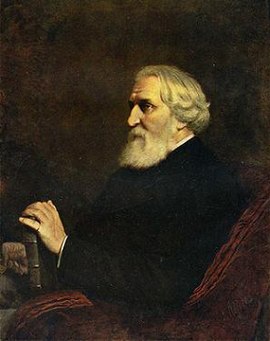Synopsis of Turgenev's "Faust" - A love story inspired by Goethe's "Faust"

Turgenev (1818-1883)Wikipedia.
Faust" is a medium-length novel written by Turgenev in 1855.
I read "Faust" in the Shincho Bunko, translated by Masao Yonekawa in "Katakoi Faust.
The following is a quote from the endnotes, which are a bit long but provide a clear synopsis of the book.
Faust" is a medium-length novel written in 1855, but it is one of Turgenev's finest works in many respects, including the completeness of form, the calmness of his life's vision, the seriousness and precision of his characterizations, his refined artistic emotion, which permeates the entire work like excellent music, and many other aspects. Turgenev's works are among the finest of his oeuvre.
Vera, the female protagonist, has inherited from her grandmother the passionate Italians' blood, which contains an immense power of lust, and from her grandfather she has inherited mystical and supernatural mental tendencies.
She is, so to speak, an aberrant woman, but at the same time, she is an intellectual endowed with a brilliant mind and refined sensibility.
Because her mother's unnatural artificial pedagogy had buried her intense tropical passions deep within, she became a wife and mother to others while retaining the bright heart of a simple, innocent girl.
Thus, until the age of twenty-seven, I had lived as an intermediate being, without being aware of the full nature of my ego, much less showing it to others.
These unnatural conditions cannot end without tragedy.
When she happened to open her eyes to the arts and discovered the nakedness of human lust, its deep significance in life, and its sweetness, her deep-seated lust was suddenly awakened from its long slumber.
Then, with the ferocity of an undeniable tyrant, he threw her into her lover's chest.
However, because of the mystical tendencies that lurked within her as a result of her grandfather's heredity, she was unable to shake off her mother's fallible upbringing, which had seeped into her from an early age.
Like a flower in a hothouse, Vera, raised under artificial conditions, had no resistance to this conflict of contradictions. She died in vain under this first trial of her life.
Shincho Bunko, Turgenev, translated by Masao Yonekawa, "Katakoi, Faust" p173-174
Some line breaks have been made.
This story is told in the form of a letter. The story progresses as the letter writer, a man named P.B., reports to his best friend about the most recent events.
P.B. unexpectedly reunites with the female protagonist, Vera, whom he once had the good fortune to ask her to marry him. However, her mother had rejected him in the past.
When Vera was reunited with her husband, she had become a mother.
P.B. has mixed feelings about this, but he will be reviving his friendship with the Vera family.
That's where P.B.'s favorite, Goethe'sFaust."and then lends the book to Vera.
This was the beginning of the tragedy.
As mentioned in the commentary above, the sensibility that had been suppressed in her exploded, with tragic consequences.
How could such a thing happen just by reading "Faust"? I wondered this when I first read it, but it must have had such a great influence on Turgenev's sensibility.
And it is not surprising that a person with such repressed and overwhelming sensibilities as Vera would do so if he suddenly read "Faust," the greatest masterpiece of mankind. Is that what Turgenev thought?
In any case, this work seems to be regarded as very important for understanding Turgenev's thought.
Thoughts - From a Dostoevskyian Perspective
There are very interesting events behind the creation of this work.
In fact, when he was writing this piece, Turgenev was in love with Tolstoy's sister. And that sister was also a married woman.
Turgenev borrowed from the mouth of P.B., the protagonist of "Faust," when he said
I know I am nearly forty, I know she is the wife of another man, I know she loves her husband. I know very well that I am left with nothing but hidden heartbreak and eventually the exhaustion of the power of life because of the unhappy feelings that hold me - I know everything. I don't expect anything, and I don't have anything waiting for me. But that doesn't make it any easier for me."
I now finally know what it means to love a woman. I am ashamed to talk about it, but it is true. I am ashamed ...... love is still egoism, and at my age I should not be allowed to be an egoist. At thirty-seven you should not be living for yourself. You should be doing something useful, living with a purpose on earth, doing your duty, your work."
Not only are the important themes of the work collectively stated here, but there are even echoes of the author's own self-discipline during this period.
Chikuma Shobo, Seiro SatoThe Life of Turgenev."P90
It was surprising to learn that Tolstoy's love affair with his sister Marya Tolstaya was a major influence on the writing of Faust.
The message of this work is also very sad. In "Turgenev: Life and Works" by Kimito Ogura, the following commentary is given.
In the face of death, the author tells us in this work that human desire is empty, that the expectation of happiness that disappeared with youth is empty, and that it is futile and selfish to try to seek it. (omitted).
He argues that it is necessary to abandon futile aspirations for happiness.
The finale of "Faust" reads as follows.
'My experiences in recent years have convinced me of one thing: life is not a joke or a comfort. Life is not a joke or a comfort. Nor is it even a pleasure. ...... Life is hard work. The refusal of desire, the refusal of ceaselessness-this is the hidden meaning of life, the key to its mystery.
To fulfill one's duty, no matter how noble, rather than to carry out one's favorite thoughts and fancies - this is what man must strive for. Without the chains on his body, without the chains of duty, man would not be able to go through the journey of life without collapsing to the end. ......
This last word is never conveyed with a rational sound in terms of the overall artistic composition of the work, which is written in a beautiful, poetic, ethereal tone, and in this sense the orator is lonely and resigned before a mystical force.
The title, "You must give up, you must give up," speaks for itself.
Hosei University Press, Kimito Ogura, Turgenev: Life and Works, p. 105-106
Many of Turgenev's later works are depressing. It is said that this was the very period that triggered this.
As mentioned in the commentary above, the resignation of "I have to give up" will come over Turgenev strongly.
This is another area where I feel a big difference from Dostoevsky, a passionate man. I feel that Dostoevsky is like a man who never gave up and continued to fight against life until the very end.
Turgenev, on the other hand, has a bird's-eye view of the times and, like a wise man with a clear view of the world, is left in a state of quiet melancholy.
I read this piece with the thought that these differences are evident in literature as well.
The above is a synopsis of Turgenev's "Faust" - a love story inspired by Goethe's "Faust".
Next Article.
Click here to read the previous article.
Click here for a list of Turgenev's recommended works.
Related Articles





































